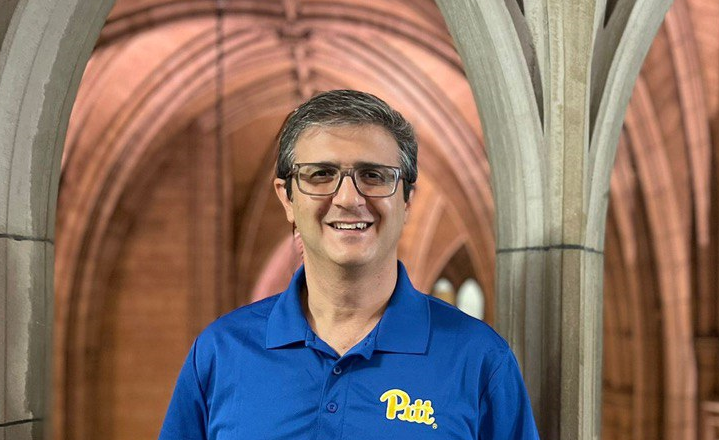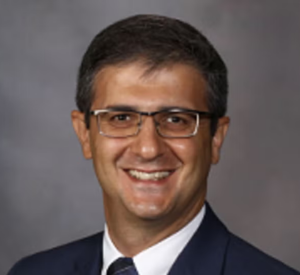Meet Assistant Professor Ahmad P. Tafti
As an assistant professor and researcher of Health Informatics in the Department of Health Information Management at the University of Pittsburgh School of Health and Rehabilitation Sciences, I am leading efforts at the Pitt HexAI Research Laboratory. I am passionate about improving health care. The power of advanced artificial intelligence (AI) and machine learning algorithms combined with diverse clinical data sources, such as medical images, radiology reports, patient-provided information and electronic health records, can mean better patient diagnosis, prognosis and treatment.
My main research focus spans two areas:
- Clinical: Musculoskeletal diseases and disorders that may follow knee or hip and/or shoulder replacement, and
- Technical: Explainable, interpretable and accountable AI and machine learning algorithms.
I obtained both my BS and MS in computer science in Iran. I started working on AI-enabled medical image analysis and computational vision even before I came to the U.S. to pursue my PhD, which I also earned in computer science from the University of Wisconsin-Milwaukee. Since then, I have been on a quest to explore and solve problems that are meaningful and make the most positive impact on people’s lives.
The Pitt HexAI Research Lab
At the Pitt HexAI Research Laboratory, our research focuses on engineering, implementing, validating and deploying cutting-edge fundamental and applied AI algorithms, and promoting their applications in health care problems, particularly in musculoskeletal diseases and disorders. Our group at the Pitt HexAI Research Laboratory is a multidisciplinary team of orthopedic surgeons, health data scientists and health informaticians. It benefits from several extramural collaborations with other academic institutions, nationwide and worldwide. Moreover, our group aims to provide the highest quality education and research experiences in AI-powered health informatics at all levels–from elementary to high school students to undergraduate, graduate and postdoctoral education levels. We are always looking for self-motivated undergraduate and graduate students, postdocs and visiting scholars to join the laboratory.
At the Pitt HexAI Research Laboratory, our team attempts to answer three main questions:
- How advanced explainable and accountable AI strategies are developing in health care, and in particular orthopedic settings,
- How they shape health care systems, and
- How they impact our health care community.

Collaboration and the Joy of Teaching
I have no doubt that the likelihood of our success will be very high thanks to the outstanding faculty members and very hard working and talented students we have at Pitt, our world-class surgeons and physicians at UPMC, plus the advanced technological atmosphere here in Pittsburgh and across Pennsylvania. I always welcome collaboration in areas of mutual interest from other academic organizations and industrial partners.
I also love teaching, especially AI-powered health care and health data science. As a teacher, it gives me a whole different perspective, where it allows me to learn and share knowledge with many others, including my very talented students here at Pitt. To me, that is the joy of teaching, indeed. In my classes, I always encourage deep understanding of concepts and ensure that no student is left behind because I care about my students’ success and edification.
AI-Powered Health Initiatives
Before arriving at Pitt, I was an assistant professor at the Mayo Clinic, where I lead several AI-powered health initiatives. For instance, I worked on total knee/hip arthroplasty (TKA/THA) research to first assemble a large-scale dataset of medical images and then designed AI-powered models to characterize TKA/THA complications in knee/hip radiographs. The project has had the potential to improve total joint arthroplasty (TJA) research, providing the underlying computational components to automatically and objectively analyze the large column of knee/hip medical images in an efficient fashion.
This is still a topic of research in my lab today, where orthopedic surgeons can become more efficient by prioritizing patients based on automated radiographic findings, rather than reviewing all radiographs manually. This improves productivity, freeing up time for our orthopedic surgeons to focus on value-added activities. The impact of precise detection, localization and characterization of THA and TKA radiographs will be significant for patient care, as the majority (>80%) of the routine TJA follow-up visits do not result in an alteration in patient management. Rather, they add substantial costs to both the patients and the health care system. Potential downstream effects on TKA/THA research will also be significant including feasibility of using imaging-based surrogate biomarkers, quantitative grading in large-scale registry-based observational studies and pragmatic trials, real time post-marketing surveillance of TKA/THA technologies and prediction of outcomes for individual patients.
Awards and Honors
In my professional career, I was the 2021 SiiM Imaging Informatics Innovator awardee, Mayo Clinic Benefactor funded CDAs Orthopedics Career Development awardee, Mayo Clinic Transform the Practice awardee, an NVIDIA GPU awardee, and GE Healthcare Honorable Mention awardee. Since August 2022, I have been honored to serve our community as the vice chair of IEEE Computer Society in Pittsburgh.


